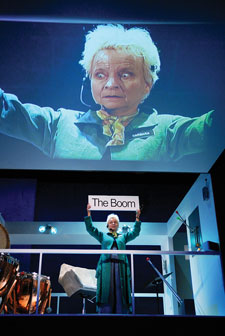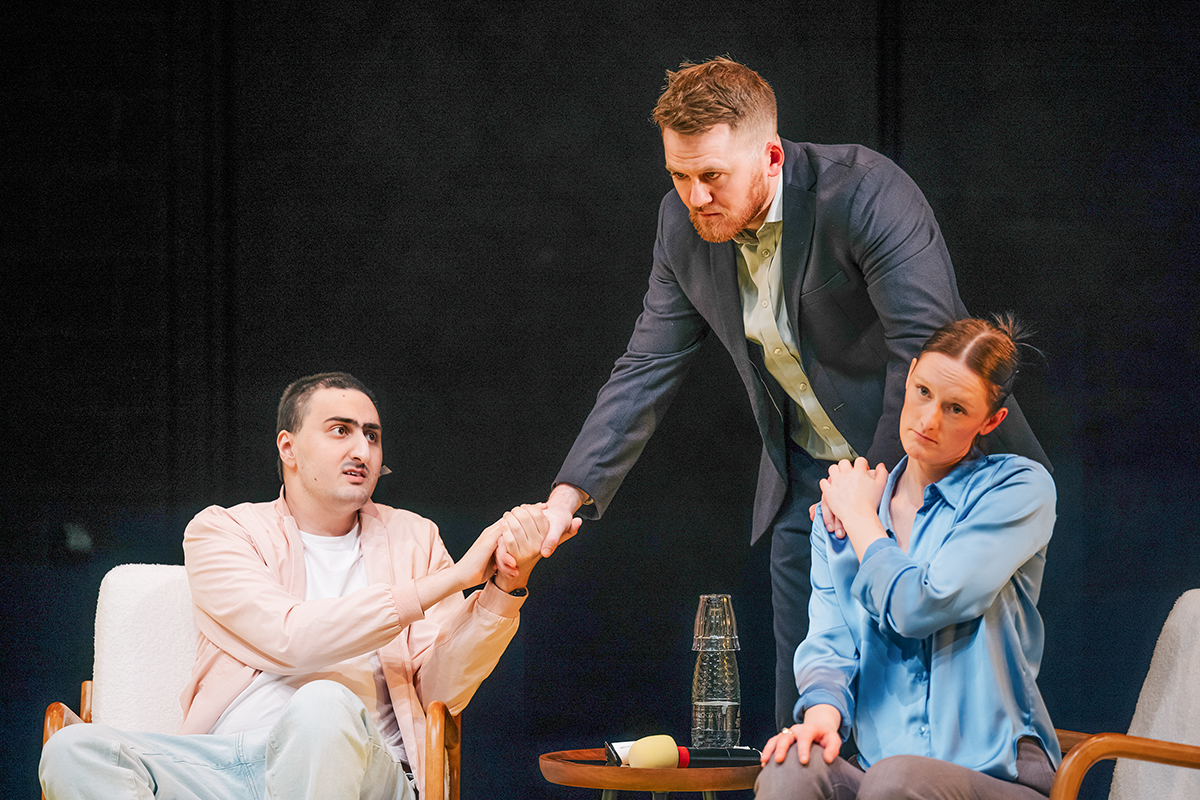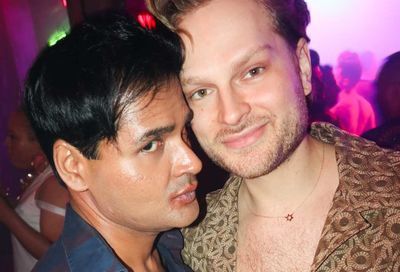Baby Boom
Don't let the sight of a futon worry you - 'Boom' is one 'ménage a trios' you'll want to join for an evening's fun
Watching an audience take their seats is always something of a pre-show entertainment, but it was particularly fun at Woolly Mammoth’s Boom with the unique stage modification known as a ”thrust.” In this permutation, center stage projects out into what would normally be audience space and seating is reconfigured to face the thrust on three sides. Needless to say, it makes for a very intimate experience for the first rows. A good portion of the audience had a major prop — a futon bed — at nose level. One had to chuckle at the combination of dread and amusement crossing the faces of the new arrivals as they settled in. Nothing quite stalls an evening like a bout of awkward theatrical coupling — especially if you’re close enough to be in the ménage.

‘Boom’
However, as it gleefully turns out, the bed is just one of the many visual teases in this fun, witty and very innovative play by Peter Sinn Nachtrieb. Although rife with contemplative and philosophical moments, Nachtrieb’s play never takes itself all that seriously. And, as anyone who’s been near a university science building knows, designer (and local architect) Tom Kamm captures the rest of this one-room set — a biologist’s basement lab turned bunker — with a keen and comical eye. Kamm also finds an unassuming and funny way to show us that our two protagonists — biologist grad student Jules (Aubrey Deeker) and his potential one-night stand Jo (Kimberly Gilbert) — are not as alone in the world as they may believe.
Though Nachtrieb starts his engines with the makings of an odd-couple romantic comedy, he quickly fires up an entirely different and much wider concept of the characters’ existence and indeed that of the human race itself. Before long, he is seamlessly moving between the increasingly complicated story of this antagonized couple in their bunker and the concealed, if nevertheless completely connected, character of Barbara (Sarah Marshall), a dweller in a separate space and reality. Each place is equally compelling and absorbing and the mystery that binds them continues to intrigue as it gains in portent. This is no small feat.
Director John Vreeke clearly gets Nachtrieb’s idea and the periodic need for whip-crack pace combined with those moments in which time must stand still for thought and language. Crucially, he allows the awe-inspiring Marshall to give us a Barbara who communicates with amazing interpretive passion as she delivers the lion’s share of humor and poignancy to this piece. With her limitless capacity for expression and suggestion, Marshall steals her every scene.
Deeker and Gilbert offer strong and vibrant performances as the bubbly eccentric, Jules, and the feisty-but-troubled Jo, but they are not quite as on point as Marshall. Their language is clever, banter-based stuff and it needs to be delivered at speed, but with interpretive rhythm. Though striving hard, neither Deeker nor Gilbert seem comfortable keeping the timing at the right comic pitch.
Nevertheless, Deeker creates a strong persona in Jules, whose personal awkwardness is humorous and believable. He doesn’t quite capture that je ne sais quoi of the academic, even a budding one, talking on his subject, but his drive to make it happen with Jo has genuine charm.
Gilbert makes for a vivid, compelling presence, but — and this rests largely with Nachtrieb — her character has the least fluidity of the three. Some of it lies with Gilbert in that she doesn’t vary Jo’s intonation much, limiting her ability to inject irony, sarcasm and even emotion into the character, but much of it is the language as written. For example, people don’t look at a fish tank and simply say, ”What kind?” Though the ambiguity leads to a laugh, it diminishes Jo’s believability. Similarly, her regular use of a particular epithet for comic effect falls flat much of the time simply because it doesn’t fit with the character. Still, even the least-effectively written character in this excellent play is fascinating to watch as events unfold.
Support Metro Weekly’s Journalism
These are challenging times for news organizations. And yet it’s crucial we stay active and provide vital resources and information to both our local readers and the world. So won’t you please take a moment and consider supporting Metro Weekly with a membership? For as little as $5 a month, you can help ensure Metro Weekly magazine and MetroWeekly.com remain free, viable resources as we provide the best, most diverse, culturally-resonant LGBTQ coverage in both the D.C. region and around the world. Memberships come with exclusive perks and discounts, your own personal digital delivery of each week’s magazine (and an archive), access to our Member's Lounge when it launches this fall, and exclusive members-only items like Metro Weekly Membership Mugs and Tote Bags! Check out all our membership levels here and please join us today!




















